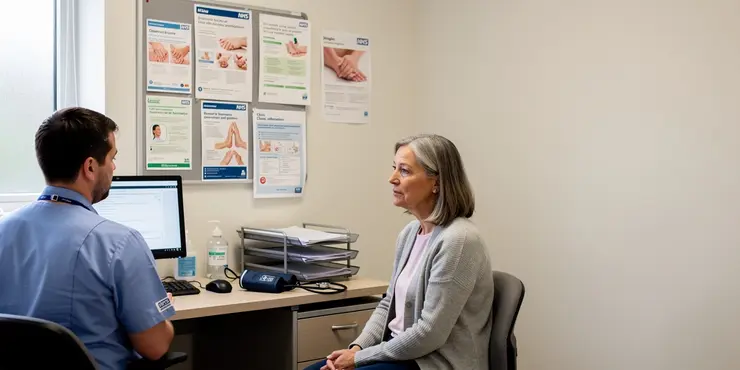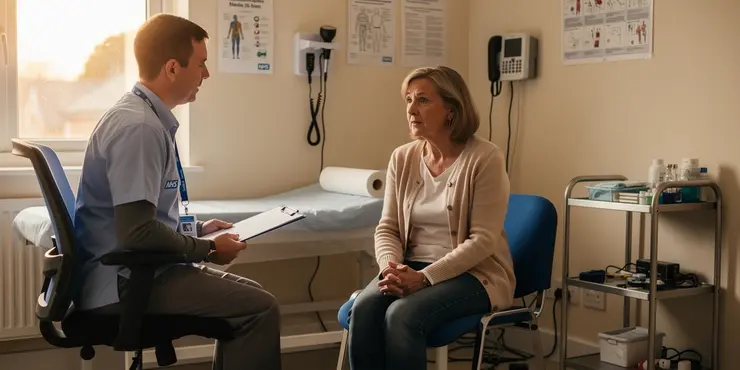
Find Help
More Items From Ergsy search
-

Can stress trigger shingles?
Relevance: 100%
-

Can stress trigger shingles?
Relevance: 96%
-

What causes shingles?
Relevance: 60%
-

What causes shingles?
Relevance: 60%
-

What is Shingles?
Relevance: 58%
-

Can stress trigger psoriasis flare-ups?
Relevance: 57%
-

What is shingles?
Relevance: 54%
-

Who is at risk of developing shingles?
Relevance: 52%
-

Can shingles be prevented?
Relevance: 52%
-

What are the symptoms of shingles?
Relevance: 49%
-

Can shingles be prevented?
Relevance: 48%
-

Is shingles contagious?
Relevance: 45%
-

Is shingles contagious?
Relevance: 45%
-

What treatments are available for shingles?
Relevance: 45%
-

Can the shingles vaccine cause chickenpox?
Relevance: 44%
-

Is the shingles vaccine safe?
Relevance: 43%
-

How is shingles diagnosed?
Relevance: 43%
-

What treatments are available for shingles?
Relevance: 42%
-

What triggers asthma attacks?
Relevance: 42%
-

Are there any complications associated with shingles?
Relevance: 42%
-

Are there any complications associated with shingles?
Relevance: 42%
-

Can the shingles vaccine cause chickenpox?
Relevance: 40%
-

What triggers a cold sore outbreak?
Relevance: 40%
-

Factors that trigger eczema in your child
Relevance: 39%
-

At what age should one get the shingles vaccine?
Relevance: 38%
-

Who is at risk of developing shingles?
Relevance: 38%
-

At what age should one get the shingles vaccine?
Relevance: 38%
-

Can stress cause asthma symptoms?
Relevance: 37%
-

Trigger Finger exam
Relevance: 37%
-

Does stress contribute to nettle rash?
Relevance: 36%
-

Can exercise trigger asthma symptoms?
Relevance: 34%
-
Can physical exertion trigger a heart attack?
Relevance: 32%
-
Does stress affect tinnitus?
Relevance: 32%
-

What foods can trigger nettle rash?
Relevance: 32%
-

How is shingles diagnosed?
Relevance: 31%
-

Can stress make Crohn's disease worse?
Relevance: 30%
-
Can stress management aid in menopause masking?
Relevance: 29%
-

Coping with Stress and Anxiety
Relevance: 29%
-

What should I do if I think I have shingles?
Relevance: 28%
-

Post-traumatic stress disorder (PTSD) - Introduction
Relevance: 28%
Understanding Shingles
Shingles, also known as herpes zoster, is a viral infection caused by the varicella-zoster virus, the same virus responsible for chickenpox. After a person recovers from chickenpox, the virus remains dormant in the body and can reactivate years later, resulting in shingles. This condition is characterised by a painful rash, often accompanied by burning, tingling, or itching sensations.
The Link Between Stress and Shingles
One of the factors often considered in the reactivation of the varicella-zoster virus is stress. Stress is a natural response to challenging or threatening situations, but chronic or extreme stress can have detrimental effects on the immune system. Research suggests that stress can weaken the immune system, potentially triggering the reactivation of latent viruses, including the varicella-zoster virus.
How Stress Affects the Immune System
When a person experiences stress, their body releases stress hormones such as cortisol. While these hormones are helpful in short bursts, prolonged exposure can suppress the immune system. A suppressed immune system is less efficient at keeping viruses in check, which might allow the dormant varicella-zoster virus to reactivate, leading to shingles. This connection explains why some individuals may experience shingles following periods of significant stress.
Evidence Supporting the Stress-Shingles Connection
Several studies have explored the relationship between stress and the reactivation of the varicella-zoster virus. Clinical observations often note that shingles can occur following major life events that cause stress, such as bereavement, divorce, or job loss. Although conclusive evidence is still being gathered, the correlation between stress levels and shingles incidence has been acknowledged by many health professionals.
Managing Stress to Reduce the Risk of Shingles
Mitigating stress is a crucial step in reducing the risk of shingles. Techniques such as regular exercise, mindfulness meditation, and proper sleep hygiene can help manage stress levels. Engaging in activities that promote relaxation, such as hobbies or socialising, can also contribute to a healthier immune system. For those under chronic stress, professional help such as therapy or counselling might be beneficial.
Conclusion
While stress is not the sole cause of shingles, its role in potentially triggering the condition should not be underestimated. By understanding the relationship between stress and the immune system, individuals can take proactive steps to manage stress, potentially reducing their risk of developing shingles. Anyone experiencing symptoms of shingles, such as a painful rash or blistering, should seek prompt medical advice for appropriate treatment.
What is Shingles?
Shingles is a sickness that gives you a painful rash. It is caused by the same virus that causes chickenpox. Even after you get better from chickenpox, the virus stays hidden in your body. It can come back later as shingles. Shingles often makes your skin hurt, tingle, or itch.
Stress and Shingles: What’s the Connection?
Stress can sometimes make the virus come back and cause shingles. Stress happens when you feel worried or scared. If you are stressed for a long time, it can make your body weaker. When your body is weak, it is not good at keeping viruses away. This can make the shingles virus come back.
How Does Stress Affect Your Body?
When you are stressed, your body makes special hormones. These hormones help for a short time. But if they stay too long, they can make your body weak. A weak body may not stop the shingles virus, so the virus can make you sick again with shingles. This is why you might get shingles after being stressed.
Is There Proof That Stress Causes Shingles?
Doctors have looked at how stress and shingles are connected. They found that people sometimes get shingles after big life changes, like losing a loved one, getting divorced, or losing a job. While not all proof is clear yet, many doctors agree that stress might make shingles more likely.
Ways to Handle Stress
Keeping stress low can help you avoid shingles. You can do things like exercise, meditate, and get enough sleep to feel less stressed. Doing things you enjoy and spending time with friends can also help. If you feel stressed all the time, talking to a therapist might be a good idea.
Final Thoughts
Stress is not the only reason for shingles, but it can make it happen. By learning about stress and how it affects your body, you can take steps to feel less stressed. This can help you avoid getting shingles. If you get symptoms like a painful rash, see a doctor quickly for help.
Frequently Asked Questions
Can stress really cause shingles?
Stress itself doesn't directly cause shingles, but it can weaken the immune system, making it easier for the virus to reactivate.
What exactly is shingles?
Shingles is a viral infection caused by the reactivation of the varicella-zoster virus, the same virus that causes chickenpox.
How does stress affect the immune system?
Chronic stress can affect the immune system by reducing its ability to fight off infections and can trigger inflammation in the body.
What are the early signs of shingles?
Early signs of shingles may include pain, burning, tingling, or itching in a specific area on one side of the body, followed by a rash.
Who is at risk for developing shingles?
Anyone who has had chickenpox is at risk, especially older adults and those with weakened immune systems.
Can stress-induced shingles be prevented?
Managing stress and strengthening the immune system through a healthy lifestyle may help reduce the risk of shingles.
Is there a direct link between stress and shingles outbreaks?
While stress does not directly cause shingles, it is considered a risk factor for triggering an outbreak in susceptible individuals.
How severe are shingles outbreaks usually?
The severity of shingles can vary; some people experience mild symptoms while others may have severe pain and complications.
What complications can arise from shingles?
Complications can include postherpetic neuralgia, vision loss, neurological problems, and skin infections.
How is shingles diagnosed?
Shingles is usually diagnosed based on the appearance of the rash and associated symptoms, though lab tests can confirm the diagnosis.
What role does the varicella-zoster virus play in shingles?
The varicella-zoster virus causes shingles when it reactivates after lying dormant in the body's nerve tissue following an initial chickenpox infection.
How long does a shingles outbreak last?
A shingles outbreak typically lasts between 2 to 4 weeks, but complications can cause longer-lasting symptoms.
Can shingles be prevented by vaccination?
Yes, the shingles vaccine can significantly reduce the risk of developing shingles and its complications.
Are there treatments available for shingles?
Yes, antiviral medications, pain relievers, and topical treatments can help manage symptoms and ease discomfort.
Can younger people get shingles?
Yes, while more common in older adults, people of any age who have had chickenpox can get shingles.
What lifestyle changes can help reduce stress levels?
Regular exercise, meditation, adequate sleep, and a healthy diet can help manage stress and support the immune system.
Does shingles affect everyone the same way?
No, shingles affects individuals differently, with varying severity and duration of symptoms.
What is postherpetic neuralgia?
Postherpetic neuralgia is a complication of shingles characterized by intense nerve pain in the area where the shingles rash occurred.
Can shingles reoccur more than once?
Yes, but it is relatively rare for someone to experience shingles more than once in their lifetime.
What measures can be taken to support the immune system?
Maintaining a balanced diet, staying physically active, managing stress, and getting adequate rest can support the immune system.
Can stress make you get shingles?
Stress doesn't make shingles happen by itself. But stress can make the body's defenses weaker. This makes it easier for the virus that causes shingles to wake up again.
What is Shingles?
Shingles is a sickness. It makes your skin hurt and get a rash. It is caused by a virus. This virus is the same one that gives you chickenpox. If you had chickenpox before, you could get shingles later. Here are some ways to get help if you have trouble reading: - Use pictures to help understand. - Ask someone to read it to you. - Use simple words to talk about it.Shingles is an illness you get from a virus. It is the same virus that makes chickenpox. The virus goes to sleep in your body and can wake up again later. This can make you sick with shingles.
How does stress affect the immune system?
When you feel worried or stressed, it can make your body less strong. This means your body might find it harder to fight off illness and germs.
Here are some ways to help:
- Take deep breaths. This can help you feel calm.
- Talk to someone you trust about how you feel.
- Do some exercise, like walking or playing, to help your body stay strong.
- Get enough sleep. Sleeping helps your body rest and be ready to fight germs.
When we feel stress for a long time, it can make our body's defense system weak. This means our body can't fight germs and sickness as well. Stress can also make our body hurt and feel swollen inside.
What are the first signs of shingles?
Signs that you might be getting shingles are:
- Pain
- Burning feeling
- Tingling feeling
- Itching
This usually happens on one part of your body. After this, you might get a rash.
Who can get shingles?
Some people have a greater chance of getting shingles:
- Older people, especially over 50.
- People who had chickenpox before.
- People with weak immune systems.
To stay safe, you can:
- Talk to a doctor about the shingles vaccine.
- Eat healthy foods.
- Get enough sleep.
Helpful tools:
- Use pictures to help understand information.
- Ask someone to explain words you don't know.
If you had chickenpox before, you might get it again. It's more likely if you are older or if your body's defense system isn't strong.
Can we stop stress from causing shingles?
We can lower the chance of getting shingles by doing things that keep us healthy and happy.
Does stress cause shingles?
Feeling very stressed can make your body feel tired and weak.
This might make it easier to get sick, like with shingles.
If you feel stressed a lot, talk to someone who can help, like a doctor.
Try relaxing activities like deep breathing or listening to music.
Stress does not make shingles happen, but it can make it more likely to get shingles if you are at risk.
How bad can shingles get?
Shingles can give you a painful rash. For some people, it might hurt a lot, but for others, it doesn't hurt as much. Most people feel better in a few weeks.
Helpful tips:
- See a doctor if you think you have shingles.
- Ask a family member or friend for support.
- Use calm, quiet activities to help you feel better.
Shingles can be different for everyone. Some people only feel a little bit sick. But for others, it can hurt a lot and cause problems.
What problems can happen if you have shingles?
Shingles can cause more problems. Here are some things that might happen: 1. **Pain that won’t go away**: Some people feel pain even after the rash is gone. This is called nerve pain. 2. **Eye problems**: If shingles are near your eye, it can cause eye trouble. You might need to see a doctor. 3. **Skin infections**: Sometimes, the rash can get infected. You might need medicine for this. 4. **Hearing or balance problems**: If shingles are near your ear, it can cause trouble hearing or make you feel dizzy. **Helpful things to try**: - **Ask for help**: Talk to a doctor or a nurse. They can give you medicine or advice. - **Use reminders**: Sticky notes or phone alerts can help you remember to take your medicine. - **Get support**: Friends or family can help you with tasks if you don’t feel well.If you get shingles, it can cause other problems. These problems can be:
- Pain that stays even after the rash is gone (called postherpetic neuralgia).
- Trouble seeing or vision loss.
- Problems with your brain or nerves.
- Skin getting infected.
If reading is hard, some tools can help. You can try:
- Audio books that read the text out loud.
- Text-to-speech apps that turn written words into speech.
- Pictures or videos that go with the words to help understand better.
How do doctors find out if you have shingles?
Doctors can usually tell if you have shingles by looking at your skin and talking to you about your symptoms. Sometimes, they might do a test to be extra sure.
What does the chickenpox virus do in shingles?
The chickenpox virus can make you sick with shingles. Shingles is like getting chickenpox again, but it hurts more.
Here are some tips to help you understand:
- Read slowly: Take your time with the words.
- Use a dictionary: A simple dictionary can explain hard words.
- Ask a friend: A friend or a helper can talk about this with you.
The varicella-zoster virus can make you sick with shingles. This happens when the virus wakes up after staying asleep in your body. It goes to sleep after you have chickenpox, and then it hides in your nerves.
How long does a shingles outbreak last?
Shingles is a rash that hurts. It usually lasts 3 to 5 weeks. But the length can be different for each person.
If you have a rash, you can:
- See a doctor for help.
- Take medicine to feel better.
- Rest a lot.
- Use cool cloths on your skin.
If you need help reading, ask someone you trust or a helper tool to read it with you.
Shingles usually lasts 2 to 4 weeks. Sometimes, problems can make symptoms last longer.
Can you stop shingles with a vaccine?
Yes, the shingles shot can help a lot. It makes it less likely for you to get shingles and problems from it.
Can you get medicine for shingles?
Yes, you can get medicine to help if you have shingles. The doctor might give you pills or cream for it.
It's good to tell a doctor quickly if you think you have shingles. This way, the medicine can work better.
Here are some things that might help:
- Resting a lot to help your body get better.
- Using cool cloths on your skin to feel less itchy.
- Asking someone to read with you about shingles for more help.
Yes, there are medicines that can help. Some medicines fight viruses. Others help with pain. There are also creams you can put on your skin. These can help you feel better when you are sick.
If you need help reading, you can ask someone to read with you. You can also use apps that read text out loud.
Can young people get shingles?
Yes, young people can get shingles.
Shingles is a virus. It can make your skin hurt and itch.
If you think you have shingles, tell an adult. They will help you see a doctor.
You can use pictures and videos to learn more about shingles.
Yes, anyone who had chickenpox can get shingles. It happens more in older people, but it can affect any age.
How can you feel less stressed?
Try making small changes in your life to help you feel calmer. Here are some tips that might help:
1. Exercise: Do some fun activities, like playing outside, riding a bike, or dancing.
2. Sleep: Make sure you get plenty of rest at night. Sleep helps you feel better.
3. Healthy Eating: Eat fruits and vegetables. They give you energy and help you feel good.
4. Talk: Share your feelings with someone you trust, like a family member or a friend.
5. Quiet Time: Take some time to relax. You can read a book, draw, or listen to music you like.
6. Deep Breathing: When you feel stressed, take deep breaths slowly. This can help calm you down.
These simple steps can make a big difference. Remember, if stress feels too much, it's okay to ask for help from someone you trust. You can also use apps that guide you in relaxing exercises or offer supportive audio and visual content to calm your mind.
There are things you can do to feel better. Try to move your body and exercise. Take some quiet time to breathe and relax, like meditation. Make sure you get enough sleep, and eat good food. All of these can help you feel less stressed and keep your body strong.
Does shingles affect everyone the same way?
Shingles can make people feel different. Not everyone gets the same symptoms. Some people might feel more pain or itchy skin. Others might feel very tired or have a fever.
If you have questions or feel sick, it's good to talk to a doctor. They can help you feel better.
Using pictures or charts might help you understand shingles more. A family member or friend can also help you read about it.
No, shingles is different for everyone. Some people get it bad, and some people don't.
What is postherpetic neuralgia?
Postherpetic neuralgia (say: post-her-PET-ik noo-RAL-juh) is a pain that lasts after a person has had shingles. Shingles is a painful rash that comes from the same virus that causes chickenpox.
Some people, when they get better from shingles, still feel pain where the rash was. This pain can stay for a long time.
Tips to help:
- Ask a doctor for help with the pain.
- Use special creams or patches that can help make the skin feel better.
- Stay calm and try deep breathing to relax.
Postherpetic neuralgia is a problem that can happen after having shingles. It causes strong pain in the nerves where the shingles rash was on your skin.
If reading is hard, you can try using tools like audiobooks or text-to-speech apps to listen to words instead of reading them.
Can you get shingles again?
Yes, you can get shingles more than one time.
Shingles is like chickenpox. If you had chickenpox before, the virus stays in your body. Sometimes, the virus can wake up and cause shingles.
To help, you can talk to a doctor. They can give you medicine to help.
Yes, but it doesn't happen often. Most people only get shingles one time in their life.
How can we help our body's defense system?
Here are simple ways to help your body's defense system stay strong:
- Eat healthy foods: Fruits and vegetables are good for your body.
- Exercise regularly: Moving your body helps keep it strong.
- Get enough sleep: Sleeping well helps your body heal and stay healthy.
- Wash your hands: Keep your hands clean to stop germs.
- Stay away from sick people: Try not to get close to people who are sick.
You can use pictures to remember these tips. Ask a grown-up to help if you need it!
Eating healthy foods, moving your body, staying calm, and sleeping well can help keep you healthy.
Useful Links
This website offers general information and is not a substitute for professional advice.
Always seek guidance from qualified professionals.
If you have any medical concerns or need urgent help, contact a healthcare professional or emergency services immediately.
Some of this content was generated with AI assistance. We’ve done our best to keep it accurate, helpful, and human-friendly.
- Ergsy carfully checks the information in the videos we provide here.
- Videos shown by Youtube after a video has completed, have NOT been reviewed by ERGSY.
- To view, click the arrow in centre of video.
- Most of the videos you find here will have subtitles and/or closed captions available.
- You may need to turn these on, and choose your preferred language.
- Go to the video you'd like to watch.
- If closed captions (CC) are available, settings will be visible on the bottom right of the video player.
- To turn on Captions, click settings .
- To turn off Captions, click settings again.
More Items From Ergsy search
-

Can stress trigger shingles?
Relevance: 100%
-

Can stress trigger shingles?
Relevance: 96%
-

What causes shingles?
Relevance: 60%
-

What causes shingles?
Relevance: 60%
-

What is Shingles?
Relevance: 58%
-

Can stress trigger psoriasis flare-ups?
Relevance: 57%
-

What is shingles?
Relevance: 54%
-

Who is at risk of developing shingles?
Relevance: 52%
-

Can shingles be prevented?
Relevance: 52%
-

What are the symptoms of shingles?
Relevance: 49%
-

Can shingles be prevented?
Relevance: 48%
-

Is shingles contagious?
Relevance: 45%
-

Is shingles contagious?
Relevance: 45%
-

What treatments are available for shingles?
Relevance: 45%
-

Can the shingles vaccine cause chickenpox?
Relevance: 44%
-

Is the shingles vaccine safe?
Relevance: 43%
-

How is shingles diagnosed?
Relevance: 43%
-

What treatments are available for shingles?
Relevance: 42%
-

What triggers asthma attacks?
Relevance: 42%
-

Are there any complications associated with shingles?
Relevance: 42%
-

Are there any complications associated with shingles?
Relevance: 42%
-

Can the shingles vaccine cause chickenpox?
Relevance: 40%
-

What triggers a cold sore outbreak?
Relevance: 40%
-

Factors that trigger eczema in your child
Relevance: 39%
-

At what age should one get the shingles vaccine?
Relevance: 38%
-

Who is at risk of developing shingles?
Relevance: 38%
-

At what age should one get the shingles vaccine?
Relevance: 38%
-

Can stress cause asthma symptoms?
Relevance: 37%
-

Trigger Finger exam
Relevance: 37%
-

Does stress contribute to nettle rash?
Relevance: 36%
-

Can exercise trigger asthma symptoms?
Relevance: 34%
-
Can physical exertion trigger a heart attack?
Relevance: 32%
-
Does stress affect tinnitus?
Relevance: 32%
-

What foods can trigger nettle rash?
Relevance: 32%
-

How is shingles diagnosed?
Relevance: 31%
-

Can stress make Crohn's disease worse?
Relevance: 30%
-
Can stress management aid in menopause masking?
Relevance: 29%
-

Coping with Stress and Anxiety
Relevance: 29%
-

What should I do if I think I have shingles?
Relevance: 28%
-

Post-traumatic stress disorder (PTSD) - Introduction
Relevance: 28%


